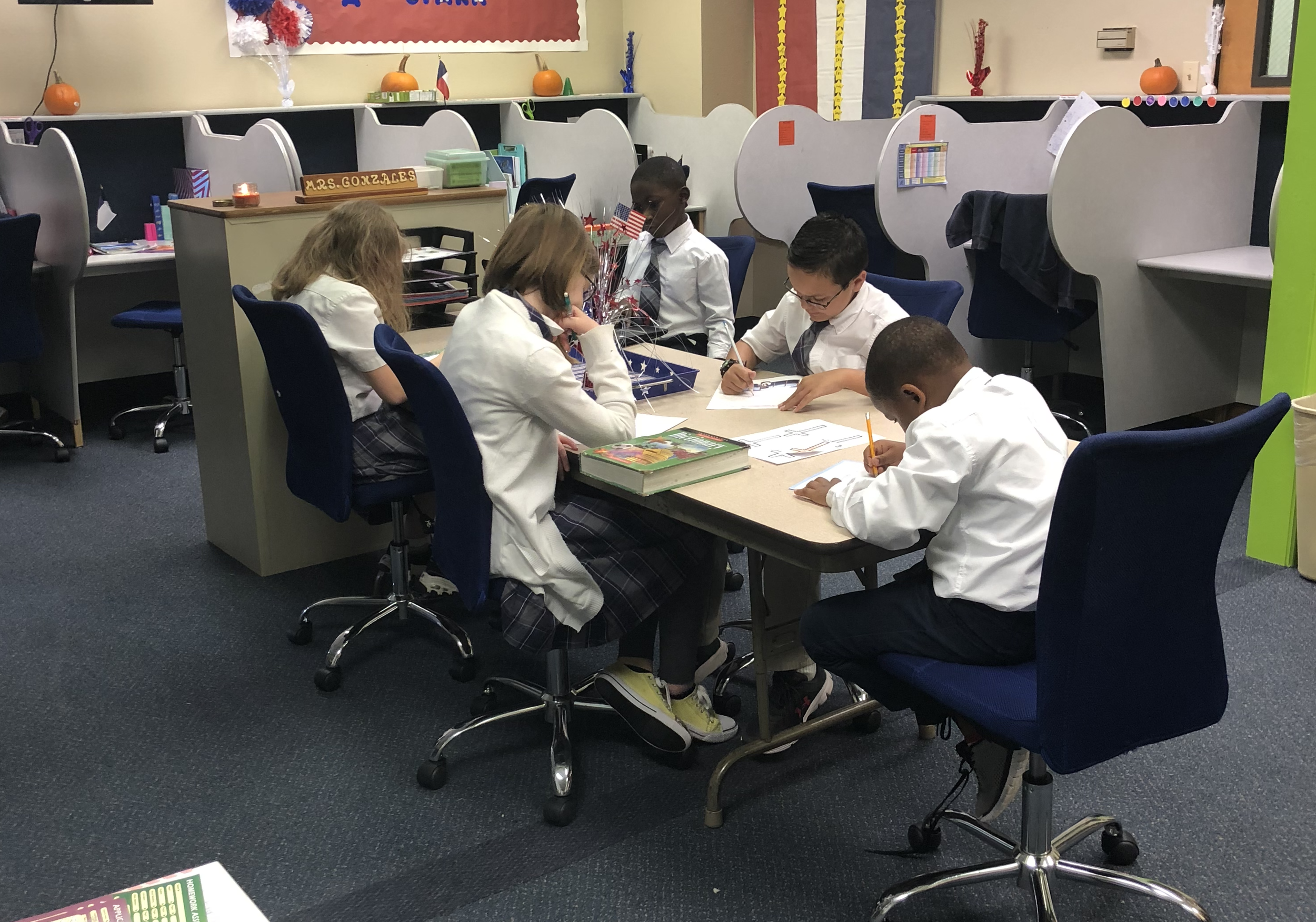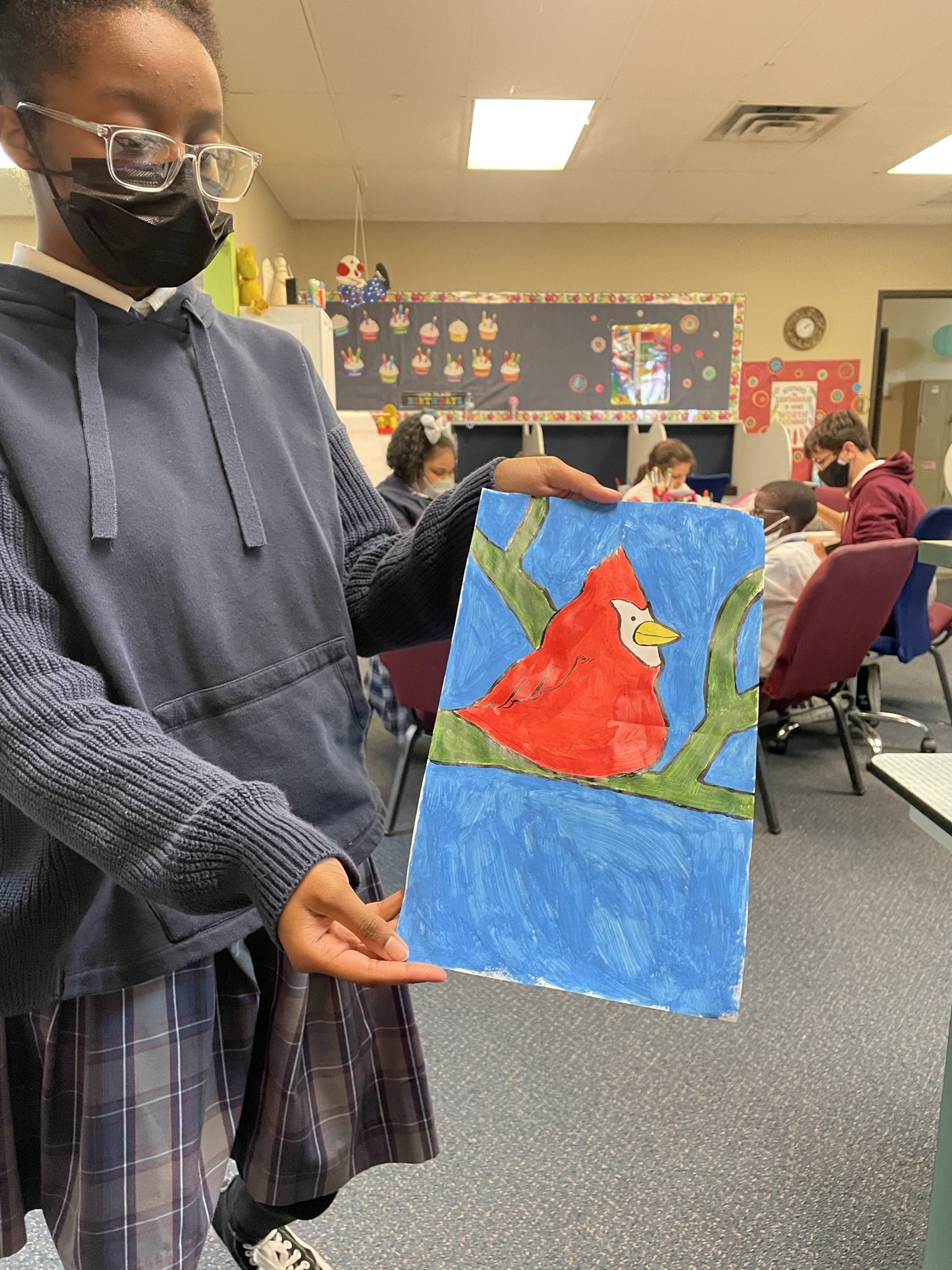
“Let the word of Christ dwell in you richly, teaching and admonishing one another in all wisdom, singing psalms and hymns and spiritual songs, with thankfulness in your hearts to God.”
Colossians 3:16
Our Goals
Our mission statement at Friendship is, “Partnering with parents to educate and disciple students.” We fulfill that mission statement, with yours and the Holy Spirit’s help, by accomplishing two primary goals: to educate and to disciple.
Education: Our goal is to help our students better understand their world, their lives, and their faith. We believe the best way of accomplishing this goal is by giving students the power to train and educate themselves. After all, our time with each student is limited to their K-12 education.
To that end, each day we assist students in setting reasonable goals. We help them understand that they have the power to accomplish those goals and should hold themselves accountable to do so.
Each students works through their learning materials at their own pace. Some students work slower than others. That’s okay. However, we constantly encourage each student to push themselves and to practice self-discipline. These skills will be important for them to have, not only for their later education, but for their future lives and careers.
If aspects of our curriculum are unclear to you, scroll down and read the curriculum sections below.
Discipleship: Our goal is to make our students better disciples of Jesus. This means building personal relationships with them and pushing them to build personal relationships with their fellow students so that they can better understand Jesus’ teachings, life, death, and resurrection and hold themselves and each other accountable to following Christ.
Accomplishing our goal of discipleship means, when students are struggling with schoolwork or difficult circumstances in their lives, we will regularly pull a student aside so we can better understand the difficulties they’re facing. We regularly counsel students on how to Biblically overcome difficulties in life. We help them understand that God has powerfully overcome all the difficulties of life through the life, death, and resurrection of His Son, Jesus Christ. Importantly, this does not mean students will never face difficulty. Simply that God’s power in their life works to redeem students’ minds and bodies, and their difficult circumstances, for His purpose and His glory. This is the most important truth they will ever know. Helping our students more fully understand it will lead them into a future where the Holy Spirit’s action in their lives increases and their redemption is fully displayed for God’s glory.
These goals are of absolute importance to us because they are of absolute importance to God. Jesus commanded us to make disciples and to teach them to follow His teachings (Matthew 28:18-20). Because better education and more meaningful discipleship are of absolute importance to us, we pray that they are of absolute importance to the parents of our students as well. Our mission is to partner with parents. That means education and discipleship must take place at school and at home. When they do, students lives are effectively changed to glorify God and to give them a more meaningful future.
Our Curriculum
At Friendship, we use A.C.E. (Accelerated Christian Education) as our primary educational curriculum. Not many people are familiar with ACE, so what follows is a detailed description of the experience of learning through ACE’s educational material. If you still have questions after reading the following sections you can contact us directly or visit ACE’s website.
The Traditional Model vs The ACE Model
When you think of a typical classroom, you may imagine a singular teacher standing at the front of a room full of students, verbally communicating a lesson about a topic which the students will later be tested on. The ACE experience couldn’t be more different and is uniquely designed to solve several key issues presented by the traditional model.
What happens when a student in a traditional classroom isn’t paying attention? What happens when a student must be absent from class one day? The material they missed is passed by and is rarely revisited. Worse, what happens when a student with a learning disability can’t keep up with the speed with which the teacher is communicating the material? What happens the next year, when the child who failed to comprehend the teaching from last year is presented with new lessons building on the previous material. Very quickly students are left behind, not comprehending key topics and lessons, and are instead trained to pass upcoming federally-standardized tests in order to progress to the next grade. Seeing these problems, ACE was structured so that, truly, no child would be left behind because comprehension and understanding, at each student’s level, are ACE’s top educational priorities.
To ensure comprehension, each student individually works through paper booklets called P.A.C.E.’s (Packets of Accelerated Christian Education). Each subject is split up into a series of 12 PACE’s each school year and students are required to complete all 12 PACE’s in each subject in order to graduate to the next grade. However, students who struggle in Math may complete Math PACE’s more slowly. Similarly, students who show an inclination towards Science may complete Science PACE’s more quickly. Therefore, it’s possible a hypothetical student, placed in the 5th grade, may be working in 4th grade Math, 5th grade English, and 6th grade Science. Each student works at their own pace to ensure better comprehension and understanding.
PACE’s
When a student is issued a new PACE in a given subject the first page of the PACE will outline what the student will learn in that PACE as well as a specific Bible verse and Biblical character trait that PACE will focus on. The student then reads informational pages and fills in the answers to questions covering those informational pages to learn the material. The student grades their own work in the PACE to ensure they are understanding the material correctly. If a student is struggling to understand the lessons in the PACE or have an inordinate amount of wrong answers, a teacher will work with them one-on-one until the student can better understand the material and can move on in his or her PACE.
Every few pages, before the PACE moves on to new material, students will encounter a “Check-Up” to make sure they are comprehending the previous material. A Check-Up is like a small, low-stakes test and, after being graded by the student, will be double-checked by a teacher to make certain the student is ready to move on.
Once all the material in the PACE is completed, the student will be tested on the PACE to ensure they’re ready to move on to the next book in that subject. However, before students take the official PACE Test, they must first take a Self-Test. The Self-Test is like a pre-test that covers all the material in the PACE. Once the Self-Test is passed, the student is given 1-2 days with the PACE to study and go back over all of the material in the PACE, especially the material they missed on the Self-Test. After this study period, the student is issued the PACE test. Once the student passes the PACE test, by scoring an 80-100, the student is given a certificate of congratulations for their hard work and is issued the next PACE.
Every step along the way, multiple fail safes ensure that the student understands and knows the material in each PACE. This way, truly, no student is left behind and each student is given real ownership of their education. However, even though ACE is tailored to ensure each student is comprehending their lessons at their own pace and level, we strongly encourage students to work ahead in subject’s they are behind in. This way, should the parents of the student decide to transfer the student to a public school system, the student’s transition can be made easier. For the hypothetical student in the section above, we may issue them less PACE’s in Science, since they are ahead in that subject, and more PACE’s in Math, since they are behind in that subject. Students are strongly encouraged to complete one PACE in each subject every three weeks in order to stay on track in all subjects. This will ensure a smooth transition to a public school system and timely graduation to college in the future.
A Day At FCA
Start of the Day & Setting Goals
Each day at Friendship starts at 8:00 AM with prayer, Scripture, and a short devotional lesson from Scripture. Then, each student sits at their own cubicle desk and sets their goals for the day on their Goal Card. Each goal is a reasonable number of pages in each PACE to complete that day. The minimum goal for grades K-8 is three pages in each PACE; four pages for grades 9-12. However, students are allowed to set a goal of more than 3-4 pages if they wish to do more. This is allowed, as long as the student’s goals can be reasonably completed that day.
Homework
Each goal that is not completed in the classroom will need to be brought home and completed as homework before the student returns to class the next day. Otherwise, the student will receive a detention (see the “Break & Detention” section below for more information on detentions). Parents will know if the student has homework and what that homework consists of by the student’s Homework Slip. A Homework Slip is filled out and brought home by the student everyday they have homework and the Homework Slip must be signed by a parent or guardian before the student returns to class the next day.
If parents repeatedly see homework goals in many subjects on a student’s Homework Slip, this may be a sign the student is struggling in these subjects. Appointments can be made with teachers by contacting us to better understand the problems a student may be facing in the classroom, or—better yet—parents can take one-on-one action with the student to better understand what the student is struggling with and why.
Schoolwork
Once the student’s goals are set, they then work to complete as many of those goals as possible in the classroom so they won’t have any homework. We strongly encourage students to work to complete Math and English in the classroom first as these are the subjects students most frequently struggle with. Schoolwork consists of students completing their goals, grading their work when necessary, and completing Check-Ups, Self-Tests, and Tests (for more information on Check-Up’s and Tests, see the “PACE’s” section above). We encourage students to complete at least two of their goals before they take a Break.
Break & Detention
Each day, at 10:00 AM, all students take a Break together. Break lasts 30 minutes for grades K-5 and 15 minutes for grades 6-12. Additional Break time can be earned by students on A, C, or E Level (see “A, C, and E Level” section below). At Break, students can play outside, eat a packed or purchased snack, and hang out with fellow students.
Students with detentions must skip 15-30 minutes of their break, depending on the severity of the detention, and must continue working to complete their goals. This means when students in grades 6-12 receive a detention they get to take no Break. Parents will know when a students receives a detention when the student brings home a Detention Slip. A Detention Slip is brought home by the student everyday they receive a detention and the Detention Slip must be signed by a parent or guardian before the student returns to class the next day. Repeated detentions are a serious sign a student is severely struggling to complete their schoolwork. Too many detentions can lead to more strict punishments including parent-teacher conferences, or even suspension or expulsion.
A, C, and E Level
Students who earn A, C, and E Level can earn 5-15 extra minutes to take on their Break and Lunch as well as several other rewards. At the end of each three-week school period we have a class-wide party, called Third Friday, to celebrate all of the students’ hard work.
Students who have completed the PACE Test for at least one PACE in every subject by Third Friday and have recited a handful of monthly-assigned Scriptures from memory earn A Level. Students on A Level are able to grade their work without first asking permission to do so from a teacher and earn 5 extra minutes to take on their Break and Lunch if they so choose.
Students who write a short essay on a topic of their choice, as well as complete the requirements for A Level, earn C Level. Students on C Level are able to grade their work without permission and get 10 extra minutes for their Break and Lunch.
Students who write a short essay on a chapter book they have read at home, who deliver the information of that essay in a short report to the whole class, and who complete the requirements of A Level earn E Level. Students on E Level are able to grade their work without permission, get 15 extra minutes for their Break and Lunch, and take a small field trip together before the next Third Friday to a recreational location of the teachers’ choice. These field trips can range from a lunch at a local restaurant, like Tokyo Japanese Steakhouse or Carmela's Mexican Restaurant, to all-day trips to locations like Colorado Canyon Amusement Center or Gator Country Adventure Park. Parents are responsible for sending students with enough money to participate in these field trips so each location is presented to the parents of E Level students before the trip is taken.
Lunch & Munch Days
After Break, students have more time to complete more of their goals. We strongly encourage students to have at least four goals completed before they take lunch at 12:00 PM. Students must pack a lunch and bring it to school each day. However, students have access to microwaves and refrigerators, so a wide variety of packed-lunch options are available. If parents are able, they are more than welcome to drop off a purchased lunch for their student at the school office or even attend lunch with their student.
Most Third Fridays we also have Munch Days. On Much Day, students and parents come together to provide a pot-luck meal for the entire school. Before Munch Day, each student is assigned a different food item—such as a drink, appetizer, or main dish—and is responsible for, with their parents’ help, bringing that food item to the upcoming Munch Day. Munch Day’s are a great opportunity for parents to help their student learn how to provide for themselves and their community and can be a time of meaningful bonding and discipleship between parents and their students and for students to grow closer to one another.
P.E. & Pick-Up
Finally, after one more period of schoolwork when students, hopefully, are able to complete the rest of their goals, the entire school has a period of physical education, recreation, and team-building. During this period, students are encouraged to get up and be active! We frequently play games such as Kickball or Four Square which encourage competitiveness as well as cooperation and team work.
After PE, the day is over and students are picked up at 3:00 PM. Parents form a line with their cars in the parking lot and a teacher will bring each student to their vehicle.
What You Can Do At Home
We strongly encourage parents to talk with their student at home every day to better understand what their student is learning about in their PACE’s. The student’s PACE’s, even PACE’s the student may not have homework in, are brought home each day for this very reason. We strongly encourage every parent to get to know what their student is struggling with at school and to figure out what the best solutions may be to get past those struggles. Our staff of teachers are available by appointment to help you with this process. After all, our mission statement is, “Partnering with parents to educate and disciple students.” That means parents and teachers each have equal responsibility in helping your child develop in their education and grow more meaningfully towards Christ.
It is an honor and privilege to work together with parents and the Holy Spirit to further God’s redeeming work in each of our students lives. Join us in this mission each day as our students become more and more like Jesus through their education, through their community, and through yours, ours, and God’s transformative action in their lives.



